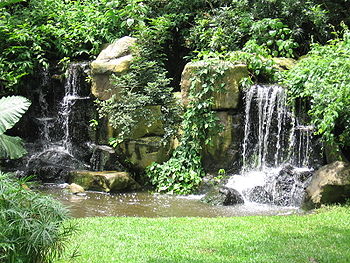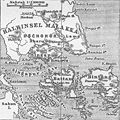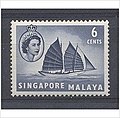Portal:Singapore
 Map of Singapore Singapore, officially the Republic of Singapore, is an island country and city-state in maritime Southeast Asia. It is located about one degree of latitude (137 kilometres or 85 miles) north of the equator, off the southern tip of the Malay Peninsula, bordering the Strait of Malacca to the west, the Singapore Strait to the south along with the Riau Islands in Indonesia, the South China Sea to the east, and the Straits of Johor along with the State of Johor in Malaysia to the north. The country's territory comprises one main island, 63 satellite islands and islets, and one outlying islet; the combined area of these has increased by approximately 25% since the country's independence as a result of extensive land reclamation projects. It has the third highest population density of any country in the world, although there are numerous green and recreational spaces as a result of urban planning. With a multicultural population and in recognition of the cultural identities of the major ethnic groups within the nation, Singapore has four official languages: English, Malay, Mandarin, and Tamil. English is the common language, with its exclusive use in numerous public services. Multi-racialism is enshrined in the constitution and continues to shape national policies in education, housing, and politics.
Singapore's history dates back at least eight hundred years, having been a maritime emporium known as Temasek and subsequently a major constituent part of several successive thalassocratic empires. Its contemporary era began in 1819, when Stamford Raffles established Singapore as an entrepôt trading post of the British Empire. In 1867, the colonies in Southeast Asia were reorganised, and Singapore came under the direct control of Britain as part of the Straits Settlements. During World War II, Singapore was occupied by Japan in 1942 and returned to British control as a separate Crown colony following Japan's surrender in 1945. Singapore gained self-governance in 1959 and, in 1963, became part of the new federation of Malaysia, alongside Malaya, North Borneo, and Sarawak. Ideological differences, most notably the perceived encroachment of the egalitarian "Malaysian Malaysia" political ideology led by Lee Kuan Yew into the other constituent entities of Malaysia—at the perceived expense of the bumiputera and the policies of Ketuanan Melayu—eventually led to Singapore's expulsion from the federation two years later; Singapore became an independent sovereign country in 1965. After early years of turbulence and despite lacking natural resources and a hinterland, the nation rapidly developed to become one of the Four Asian Tigers. With its growth based on international trade and economic globalisation, it integrated itself with the world economy through free trade with minimal trade barriers and tariffs, export-oriented industrialisation, and the large accumulation of received foreign direct investments, foreign exchange reserves, and assets held by sovereign wealth funds. As a highly developed country, it has one of the highest GDP per capita (PPP) in the world. Identified as a tax haven, Singapore is the only country in Asia with a AAA sovereign credit rating from all major rating agencies. It is a major aviation, financial, and maritime shipping hub and has consistently been ranked as one of the most expensive cities to live in for expatriates and foreign workers. Singapore ranks highly in key social indicators: education, healthcare, quality of life, personal safety, infrastructure, and housing, with a home-ownership rate of 88 percent. Singaporeans enjoy one of the longest life expectancies, fastest Internet connection speeds, lowest infant mortality rates, and lowest levels of corruption in the world. Singapore is a unitary parliamentary republic in the Westminster tradition of unicameral parliamentary government, and its legal system is based on common law. While the country is de jure a multi-party democracy with free elections, the government under the People's Action Party (PAP) wields widespread control and dominance over politics and society without much electoral competition. The PAP has governed the country continuously since full internal self-government was achieved in 1959, and currently holds a supermajority with 79 out of 93 elected seats in Parliament. One of the five founding members of ASEAN, Singapore is also the headquarters of the Asia-Pacific Economic Cooperation Secretariat, the Pacific Economic Cooperation Council Secretariat, and is the host city of many international conferences and events. Singapore is also a member of the United Nations, the World Trade Organization, the East Asia Summit, the Non-Aligned Movement, and the Commonwealth of Nations. (Full article...)Selected article -Money No Enough (Chinese: 钱不够用; pinyin: Qián Bǔgòu Yòng) is a 1998 Singaporean comedy film written by Jack Neo, directed by Tay Teck Lock, and produced by JSP films. The movie stars Neo, Mark Lee and Henry Thia as three close and best friends who start a car polishing business together to resolve their financial problems. Released in cinemas on 7 May 1998, the film received mixed reviews from critics but earned over S$5.8 million and was the all-time highest-grossing Singaporean film until 2012. Its success helped revive the Singaporean film industry and pave the way for the emergence of other Singaporean cultural phenomena. It was followed by a second standalone installment titled Money No Enough 2, which was directed by Neo, and also starring Thia, Lee and Neo himself, and was released during the National Day period on 31 July 2008. A third standalone installment titled Money No Enough 3, was also directed by Neo and also stars Lee, Thia and Neo himself, and is released during Chinese New Year period on 1 February 2024. (Full article...)Selected picture The Jurong BirdPark (Chinese: 裕廊飞禽公园; Malay: Taman Burung Jurong), is a tourist attraction in Singapore managed by Widlife Reserves Singapore. It is a landscaped park, built on the western slope of Jurong Hill. It is located within the Boon Lay Planning Area of the Jurong district and has an area of 202,000 square metres. Read more... General imagesThe following are images from various Singapore-related articles on Wikipedia.
Selected biography -Tao Li (Chinese: 陶李; pinyin: Táo Lǐ; born 10 January 1990) is a Chinese-born Singaporean competitive swimmer who specializes in the backstroke and butterfly. Tao has represented Singapore at the Southeast Asian Games (SEA Games), the Asian Games, World Championship, Commonwealth Games and Olympics. She holds several national records and is the only female Singapore swimmer who qualified for an Olympic Final. (Full article...)Did you know (auto-generated)
In this month
More did you know -
Selected panoramaA night time view of Bishan Park after its renovation under the Active, Beautiful, Clean Waters (ABC Waters) Programme. Singapore topicsRelated portalsSoutheast Asia Other Countries Tasks
CategoriesWikiprojectsAssociated WikimediaThe following Wikimedia Foundation sister projects provide more on this subject:
Discover Wikipedia using portals |






























































